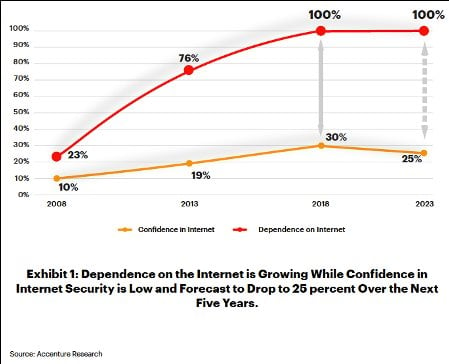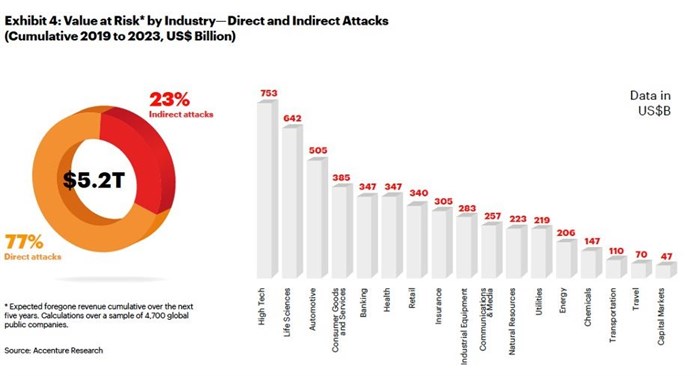The once open, global internet has outgrown its original purpose as a communication and information-sharing tool. It has become more complex, fragile and a breeding ground of intelligent cybercrimes.
So far, digitally fuelled innovation has outpaced the ability to introduce adequate safeguards against cybercriminals. Attackers need only a single lucky strike, while defenders must be constantly vigilant against any potential type of intrusion. Unless business leaders take effective action, there is a real risk that this lack of safeguards could reduce the growth of the entire digital economy, hurting companies and the economy.

Wandile Mcanyana, Security Lead for Accenture in Africa
CEOs are aware of the problem, have handled many cyberthreats, and increased spending on cybersecurity, but their efforts have not solved the larger issue - Trust.
When a person creates an online account, makes a purchase from a website or downloads an app, it’s more than the exchange of data, goods or services. It’s a transaction of trust. Today, there is a real risk that trust in the global digital economy is eroding.
The internet can’t keep up
The question is, how did today’s problems of internet security originate?
The internet was initially developed to enable high levels of data sharing, which requires trust. As the internet evolved from a military communications asset in the Cold War to an open infrastructure, security considerations focused on preventing physical failures rather than preventing cyberattacks, largely because modern forms of cyberattack did not exist at the time.
Statistics show that in 2007 there were 1.2 billion internet users. Ten years later, the recorded number was 4.2 billion (almost 4 times as many). It is also estimated that the number of IoT-connected devices will likely reach 25 billion by 2021, and by 2024, Long-Term Evolution (LTE) networks (or 4G) will cover an estimated 90% of the population, with 5G networks covering about 40%.
Handling these connections, however, requires more lines of code, more data and more capacity. Without a more resilient and trustworthy Internet, a single breach can have serious, cascading effects.
Although 68% of CEOs report that their businesses’ dependence on the Internet is increasing, they acknowledge that their confidence in Internet security, already low at 30%, will drop even lower if nothing changes to improve it. In the next five years, the confidence level in the Internet is forecast to drop to 25%, while dependence on it is assumed to remain at 100%.
What can CEOs do?
Accenture recently conducted an analysis with 30 leading technologists and additional fieldwork with 1,700 C-level executives. Through this, we uncovered three concrete actions CEOs can take to begin the crucial work of securing the digital economy: Governance, Business Architecture and Technology.
Securing the digital economy is more than fixing internet technology and network issues. It is firstly an issue of improving governance. CEOs need to join forces with other top executives, government leaders and regulators to develop principle-based standards and policies to safeguard the internet.
The next two actions require a focus on engineering and technology solutions (below ground), while addressing the many challenges related to business operations, strategy, politics and economics (above ground). To some CEOs, above-ground decision-making opportunities may seem more accessible than below-ground choices, but leadership is needed in both, even from CEOs outside the technology sector.
Some above-ground actions include steering the business architecture – business model and value chain – in a direction that makes the enterprise secure. This can be, for instance, committing to giving data access only to people who need it and who have the right credentials, and extending this commitment to partners in the entire business ecosystem. Committing to sharing information about cyberattacks helps prevent “trust incidents” and improve a company’s ability to resist new attacks and boosts data reliability.
Above all, a model of security by design embedded from the earliest stages of development should be adopted and CISOs are key in enabling this, especially if they influence decisions at board level.
By making decisions to update everything from devices to cables and networks, CEOs can support the complexity and connectivity of today’s internet while also promoting security. All CEOs can also influence and inspire technology infrastructure investments below-ground. Regularly upgrading systems helps to resolve vulnerabilities in basic internet protocols. The edge computing universe represents a revolutionary stage of the Internet to analyse data in real-time.
Through collaborative work with cross-industry coalitions, CEOs can develop standards for edge devices, establish certification frameworks like international mobile phone standards and incentivise the ongoing adoption and evolution of security innovation. Quantum computing is another emerging option that allows greater opportunity for fraud detection for financial services, supply chain and purchasing, advertising scheduling and advertising revenue maximisation for the media industry.
Keeping tabs on cybersecurity investments
For CEOs, one of the most glaring challenges of an insecure internet is the economic cost. In the private sector, over the next five years, companies risk losing an estimated US$5.2 trillion in value creation opportunities from the digital economy – that is almost the size of the economies of France, Italy and Spain combined – to cybersecurity attacks. (See Exhibit 4). This translates to 2.8% in lost revenue growth for the next five years for a large global company. High-tech industries face the highest risk, with more than US$753 billion hanging in the balance.
CEOs are stepping up their spending on cybersecurity to protect their businesses, but will be spending more on cybersecurity lead to a secure digital economy?
In our survey, 59% of organisations say the internet is becoming increasingly unstable from a cybersecurity standpoint and they are not sure how to react. While some companies aren’t spending enough, others may be spending excessively in response to their low tolerance for cybersecurity risk, and still more, others spend in the wrong areas, including projects that do
not deliver effective risk reduction.
According to 61% of CEOs, increasing a company’s cybersecurity budget may not be the answer, as they believe that the security issues of the digital economy are far too big for their organisation to handle alone.
Paving the way for a trustworthy digital economy
Without trust, the future of our digital economy and its nearly limitless potential is in peril. Fragmentary efforts to address cybersecurity issues have fallen short.
CEOs should embrace new technologies that can advance their businesses and enhance digital safety. Meanwhile, they should elevate their understanding of how the same technologies can introduce unintended vulnerabilities.
The actions of CEOs driving above ground and influencing below-ground matter. By joining forces with other CEOs, public sector leaders and regulators, they can develop much-needed guidelines and oversight mechanisms. By protecting their own organisation and extending protection through its value chain, they will safeguard the business ecosystem. By embracing and developing technologies that can advance their businesses and enhance digital safety, CEO engagement can drive a trust turnaround for the Internet and secure the future of the digital economy.
At Accenture, we fully embrace participation in the 4IR and have been actively innovating in the technology space for many years prior. Securing Digital Transformation is a core theme and Accenture has become an Intelligent Operations partner-of-choice for organisations who wish to seamlessly navigate through the ebbs and tides of digital transformation to navigate the waves of success in this perpetual ocean of change.
Accenture has worked with clients across the globe to plan and manage cloud rollouts to be compliant with local regulations, assessing, mitigating operational risks and helping gain regulatory approval.






























